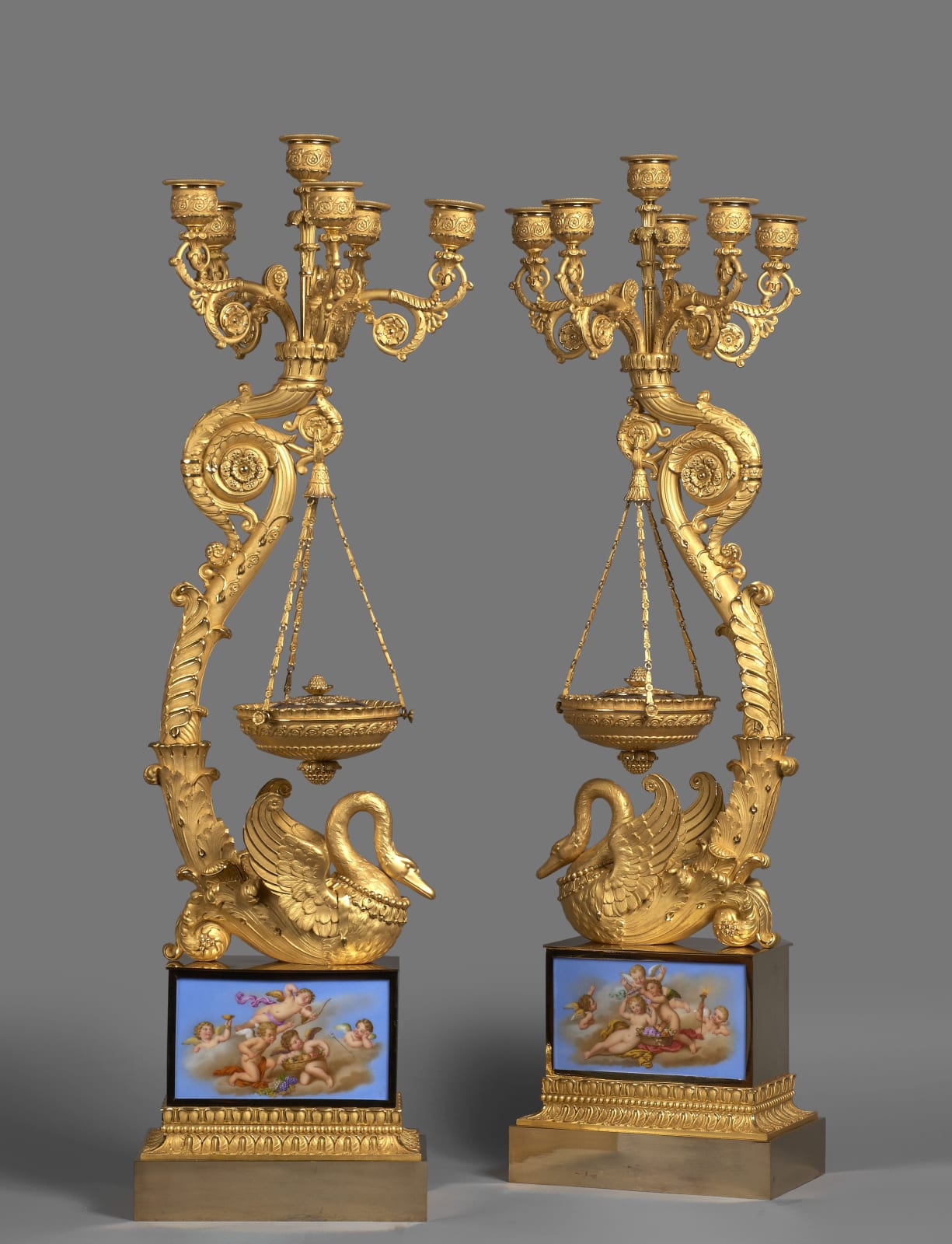Pierre-Philippe Thomire (attributed to) French, 1731-1843
Provenance
Remaining within the same family since the nineteenth century until the present day.
A very rare pair of Empire gilt bronze and polychrome painted enamel six-light candelabra with brûle-parfums attributed to Pierre-Philippe Thomire, each with an elaborate scrolled acanthus wrapped shaft headed by a fluted and foliate wrapped cornucopia, at the junction of which and hanging from three chains is a brûle-parfum with a pierced foliate cover and foliate finial above a foliate boss, the cornucopia supporting an upright candle branch surrounded by five scrolling acanthus wrapped branches each terminated by a vase-shaped nozzle, the main scrolled shaft issuing from the back of a swan whose bent neck echoes the sinuous lines of the conjoined shaft and cornucopia, the swan seated on a rectangular gilt bronze plinth set at the front with a rectangular enamel plaque, each painted with differing scenes of cherubs amid clouds, one with a young goddess attended by four cherubs, one of which is crowning her, another is presenting a basket of flowers and another holds a flaming torch, the other plaque showing the figure of Cupid flying through the air as he shoots an arrow from his bow with four cherubs below, one dreaming, one with a basket of fruit and another with a flute, the porcelain plaques above a stepped rectangular base with a thick acanthus cast band and beaded border
Paris, date circa 1815-20
Height 81 cm, length 22 cm, depth 22 cm. each. The porcelain plaques: Height 9 cm, length 16 cm. each.
The quality and style of the finely chaste bronze work would suggest that these wonderful candelabra were made by the renowned fondeur-ciseleur Pierre-Philippe Thomire (1751-1843) who, patronised by Louis XVI and later by Napoleon and his Imperial court, headed one of the very finest firms of bronziers during the late eighteenth and early nineteenth centuries. Not only highly original they epitomises the taste of the late Empire period when the forms and decoration of previous years became bolder and more flamboyant. The overall design is cleverly conceived so that the scrolling lines of the conjoined cornucopia and shaft, the candle branches and the swans' necks are counterbalanced by the vertically hanging brûle-parfums while the robust bronze work contrasts with the delicate enamel plaques.
Their design includes a number of references to Antiquity notably the abundant use of acanthus leaves as well as the inclusion of the classical brûle-parfums in addition to the swans. The latter, which pulled Zeus's chariot, were an attribute of Apollo and also because of their beauty an attribute of Venus. From the Consulate on they became an important motif within the decorative arts; the Empress Josephine ordered several including black swans from the Bass Straits for the park at Malmaison while inside the palace her bedroom suite included a gilded bed with cornucopiae and swans at its feet. Swans also adorned Madame Récamier's bed which was designed by Louis-Martin Berthault and made by Jacob-Desmalter circa 1799 (Musée du Louvre) as well as some of the decoration at Hôtel de Beauharnais for Prince Eugène in 1803. As attributes to Venus, the swans like the porcelain plaques allude to the theme of love. The style and configuration of the delightful winged cherubs was almost certainly inspired or even derived from engravings after drawings by the celebrated Rococo painter François Boucher though interestingly the dreaming cherub who rests his left elbow on a cloud and his cheek in his hand bears a close comparison to one of the cherubs at the foot of Raphael's Sistine Madonna (1513-14; Germaldegalerie, Dresden).
